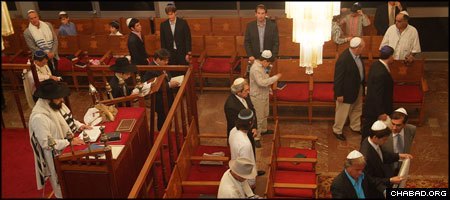When tens of thousands of Jewish men, women and children walk through the doors of Chabad-Lubavitch centers all over the world for Yom Kippur prayer services, they won’t be expected to pay a dime.
The reason, says Rabbi Yossi Marrus, is simple.
“A Jew shouldn’t have to pay to pray,” explains the program director at Chabad-Lubavitch of San Antonio, Texas. “A Jew belongs in synagogue on the High Holidays, regardless of finances or affiliation.”
That message, however, comes at a price. The recent economic downturn has not only hit congregants’ pocketbooks, but the charities they donate to. And with the High Holidays of Rosh Hashanah and Yom Kippur drawing the most attendants of any other day of the year, Chabad Houses – from the small congregation meeting in an emissary couple’s living room to the large synagogues in major American cities – have also felt the pinch.
No matter, says Rabbi Moshe Eliezer Liberow of Colorado Springs, Colo., despite the fact that for decades synagogues across the religious spectrum have seen fit to sell tickets to services at the busiest time of the year.
“Did Abraham charge people when he welcomed them into his tent?” he states emphatically. “Think about it: Should we really be charging someone to have a private conversation with G‑d?”
Bob Sherbin, a resident of California’s Silicon Valley who goes to the Chabad House in Sunnyvale, agrees.
“A majority of Jews fell they should be in synagogue” at this time of year, says Sherbin. “But a great many are turned off by the idea that, in order to do so, there needs to be a financial transaction. Especially this year.”
Turning specifically to the economy, Sherbin says that while his locale has yet to deal with substantial layoffs, “people are afraid of what’s coming.”
“They’re afraid by what they read in the newspapers,” he continues. “We also have a very transient Jewish community here: lots of Israelis and college graduates with unfulfilled dreams of high-tech stardom. They receive a warm welcome [at Chabad].”
All told, Chabad-Lubavitch centers in more than 1,000 cities worldwide will be hosting Yom Kippur services beginning Monday night. Attendance at such services can range from several dozen residents in a newly-opened center serving an area with comparatively few Jews, all the way to well more than 1,000 people in more established communities. Some locations, like the dozens of Chabad Houses serving tourist areas throughout Asia, will see a predominantly Israeli backpacking crowd. (Click here to find a service near you.)
Marrus, who says that many of the people who attended last year’s services contributed a suggested donation after the holiday, tells of a woman he met on Rosh Hashanah last week.
“I blew the shofar (ram’s horn) for her,” relates the rabbi. “She hadn’t heard the shofar in 30 years. People like her, who’ve been living on the outskirts of Jewish communal life, don’t buy tickets for the holiday service; many have yet to walk into a synagogue at all.
“It would be anathema, then, to ask them for a donation when they finally do,” he continued. “We welcome all Jews with open arms.”





Start a Discussion